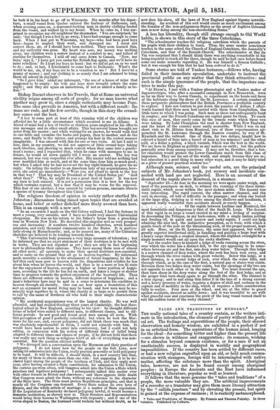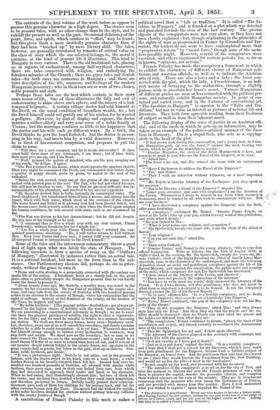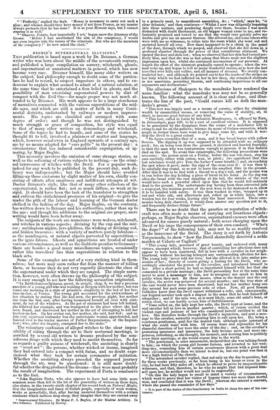TALES AND TRADITIONS OF HUNGARY. * TH:E really national tales of
a country contain, as the writers inti- mate in the introduction, the elements of poetry without the poeti- cal art. The feelings and superstitions of the people, their shrewd observation and homely wisdom, are exhibited in a perfect if not in an artistical form. The aspirations of the human mind, longing for the ideal—for something better and higher than the present life —are shown in wildness and exaggeration; its romance, wishing for a stimulus beyond common existence, or for a rare if not an unattainable success, is displayed in worldly and geographical impossibilities. If the country has been settled by different races, or had a new religion engrafted upon an old, or held much commu- nication with strangers, foreign will be intermingled with native matter, affecting the substance more than the spirit. Aboriginal tales, however, are not to be found except among aboriginal peoples : in Europe the Ancients and the East have influenced everything in literature, popular as well as learned. - It follows that the more genuine the "tales and traditions" of a people, the more valuable they are. The artificial improvements of a recorder or a translator may give them more literary attraction by the " callida juncture" and by elevating the prosaic, but spirit is gained at the expense of raciness ; it is rusticity metamorphosed.
• Tales and Traditions of Hungary. By Francis sad Theresa Pulszky. In three volumes. Published by Colburn.
The contents of the first volume of the work before us appear to possess this genuine character in a high degree. The stories seem to be peasant tales, with no other change than in the style, and to exhibit the present as well as the past. Occasional deficiency of the point, force, and spirit, which conduce to "effect," may be found ; but this gives them a more decidedly genuine character than if they had been "touched up" by mere literary skill. The tales, however, are generally introduced by remarks of critical value on the class of story which the one selected belongs to, the moral it contains, or the kind of peasant life it illustrates. This kind in Hungary is very various. There is the old traditional tale, placing us in regions of enchantment, among half-mythical characters; there are tales connected with religion, and embodying the fabulous miracles of the Church ; there are gipsy tales and Jewish tales—for both races are numerous in Hungary; and there are tales descriptive of the life, manners, and feelings of the modern Hungarian peasantry; who in their turn are or were of two classes, noble peasants and serfs.
Perhaps those tales are the best which contain in their story some lesson of life. One of these illustrates the folly and evil of endeavouring to shine above one's sphere and the misery of a bad- tempered helpmate. A certain village doctor had sold -himself to the Devil, on the usual condition of boundless wealth, &c. ; but the Devil himself could not gratify one of his wishes, for he wanted a pedigree. However, by dint of display and expense, the doctor marries a rather elderly and very sour scion of a noble family at Vienna; but the marriage conduces so little to his happiness that the doctor and his wife each go different ways. By a trick, the Devil thinks he gets the bond forfeited; but the doctor is as cun- ning in his way, and meets him by a valid demurrer. However, he is tired of his constant companion, and proposes to put the claim to issue.
"'Wilt thou try a new compact, and let it decide irrevocably ? If thou eanst fulfil three more of my commands, I am thine ; but if thou failst, thou must give me up, and I am freed.'
"'Well,' grinned the patron of mischief, who saw his prey escaping out of his reach, be it thus : I agree.' "The Pan returned to his house, which stood opposite the spacious church. That very night he summoned the Devil, and commanded that before dawn, a quarter of poppy should, grain by grain, be nailed to the roof of the cathedral.
"Before the cock crowed, every one of the grains of the poppy were at- tached with pointed pins to the roof. The Pan, who had not closed his eyes, felt still less inclination to rest. He saw that no physical difficulty was in- surmountable to his attendant, and resolved to try another expedient. "He therefore desired him to bathe instantly in consecrated water. The Devil shuddered ; but transformed himself into a mouse and sprang into the vessel, filled with holy water, which stood at the entrance of the church. The water hissed and boiled as if glowing iron had been thrown into it, and the mouse came forth severely scalded, so that when the Devil again adopted his human semblance, he was covered with scars, such as are occasioned by fire.
"The Pan was driven to his last intrenchment ; but he did not despair. He was sure of his triumph as he said, "'I command thee to live a whole year with my dear consort, Panne Twardowsky, without forsaking her for a single day.' " to live a whole year with Parma Twardowsky !' retorted the van- quished gentleman, chuckling. 'No, I will rather return to hell without thee. Keep your Panne and your soul ; I cannot fulfil your command. An ill-tempered woman is insupportable to the Devil himself !' "
Some of the tales and the interwoven commentary throw a good deal of light upon what was lately the state of Hungary. The following anecdote is from a species of essay on the "Outlaws of Hungary," illustrated by instances rather than an actual tale. It is a national incident, but more in the form than in the sub- stance. Our Parliamentary electors did, perhaps do sin as griev- ously, without the grace to own it.
"Horse and cattle stealing is a propensity connected with the ancient no- madic life of the nation. A handsome horse or a stately bull on the great plain often so powerfully tempts the Hungarian peasant that he can hardly resist the desire to possess it. "About twenty years ago, Mr. Borbely, a wealthy man, was noted in the country for his eccentricities. He was fond of meddling in the county elec-
tions, and once rode from the county of Szabolos with two hundred peasant nobles to an election in the county of Beregh, where his companions had the right of suffrage. Arrived at the frontiers of the county, on the borders of the Tisza, he stopped, and said—
"'My noble brethren ! [The peasant nobles—freeholders—are always ad- dressed by the higher classes of nobility with the words noble brethren.'] We are proceeding to a constitutional solemnity in Beregh ; we are to exer- cise there the greatest privilege of nobility, the right to elect a representa- tive for the Diet ; and we must be mindful to behave in a manner becoming our station. We shall see there many horses, many oxen—handsome oxen. Let, therefore, every one of us well consulthis conscience, and closely examine whether he is able to resist temptation : it is yet time. Whosoever does not feel himself strong enough to subdue every inclination to weakness, may step forth and return. We stand now on the boundary, but as soon as we have crossed the Tisza we are in the neighbour-county ; and it would be a cruel shame if fewer of us were to return than have set out, and if several of our number should remain behind in the county-house, not up-stairs in the great county-hall as guests, but below in the gaol, shut up as thieves. Con- sider, noble brethren, and decide.'
"It was a picturesque sight. Borbely in red attire, cut in the peasant's fashion, with the drawn sword in his hand, rode on a roan horse ; a white feather flowed on his broadly-rimmed black felt hat. Around him were as- sembled two hundred peasants of Szabolos, all adorned with similar white feathers, their party sign; and in their rear halted forty cars, from which they had descended to approach their leader and listen to his discourse. When he had ended, they thunderingly cheered him ; but two of them left the ranks, and declared they doubted whether they could resist temptation, and therefore preferred to return. Borbely loudly praised their conscien- tiousness gave each of them ten shillings for his journey back, and led his other virtuous heroes over the Tisza. His speech had the wished-for results, as his noble brethren decided the election without getting into any collision with the county justice of Beregh."
A contribution of Francis Pulszky to this work is rather a political novel than a " tale or tradition." It is called " The Ja- cobins in Hungary," and is founded on a plot which was detected and punished towards the close of the last century. The precise objects of the conspirators were not very dear, or they have not been clearly explained ; but, though originating in the principles of the rights of man as propounded in France by Girondists and Ter- rorists, the leaders do not seem to have contemplated more than " progressive reform" by " moral force," though some of the mem- bers possibly might. However, several of the conspirators were executed, and others imprisoned for various periods, for, so far as is known, "opinions, not actions." Francis Pulszky has made this conspiracy a framework in which to exhibit the characters of different classes of Hungarian poli- ticians and Austrian officials, as well as to indicate the Austrian arts of rule. There are also a lover and a lady ; the lover con- nected with the plot, which the lady, a Frenchwoman, is an indi- rect means of betraying to the authorities, through a slightly jealous wish to ascertain her lover's secret. Various Hungarians of different grades are more or less connected with the political per- sons, and naturally exhibit Hungarian society. In point of sus- tained and varied story, and in the features of conventional art, "The Jacobins in Hungary" is superior to the "Tales and Tra- ditions," but not in. value or interest as pictures of national life and literature. They both form agreeable reading, from their freshness of subject as well as from their inherent merit.
The following display of the sense of justice in an Austrian offi- cial, and of the mode in which he gets up an information, may be taken as an example of the politico-satirical manner of the Jaco- bins in Hungary. Ilia is a stupid Serb, who acts as a copying- clerk to the head of the plot.
"It had grown dark during this conversation, and a young man, in a sim- ple Hungarian garb, (it was the Jurat,)* opened the door, bearing two tapers, which he put on the mantelpiece, saving-
" 'Domine Magnifico, the clerk of the Abbot Martinovitch is here, and requests to speak to you, who are the Fiscal of the Emperor, as he says.' " 'Admit him.'
"The Jurat went out, and Ilia entered the room with an embarrassed mien.
" Have I the honour to address the Fiscal of the Emperor ?'
" Yes,' said Nemet. "'Then I wish an interview without witnesses, on a most important matter.'
" Mr. Fekete is likewise Attorney of the Exchequer : you may speak in his presence.' " 'But is he likewise a friend of the Emperor ?' inquired Ilia. "Nemet grew attentive, and said with emphasis—' I am the Attorney of the Crown. Whomsoever I desire to remain in my room when business is transacted, must be trusted by all who wish to communicate with me. Tell me your business.' " I have discovered a conspiracy against the Emperor,' said the Serb, after some hesitation.
"'A conspiracy !' exclaimed Mr. Nemet. 'Domino Frater Fekete, sit down at the table ; take up your pen, attend to every word of this gentleman, and write what I dictate.'
"He now turned to Ilia-
" What is your name, age, religion, and occupation r-
" Ilia Spirtovitch, twenty-six years old; I inn the clerk of the Abbot of Sasvar: " Your religion ?' "'Can you not omit this ?' asked Ilia. g "'Then write Catholic.'
" Domine Frater,' said Nemet to the young attorney, this is your first
official transaction. Write as follows—On the 15th of August 1794, at eight o'clock in the evening, Mr. Ilia Spirtovitch, twenty-six years old, Ro- tnan Catholic, clerk of the Right Reverend the Abbot of Sasvar Ignaz Mar- tinovitch, came to the chambers of the undersigned, and made the following deposition about an awful and pestiferous conspiracy against the life of his Sacred Majesty, and against the constitution, the public order and security of the state, which conspiracy the said Ilia Spirtovitch has discovered.'
" Feketc stared at the Attorney of the Crown, and observed- " 'These were not precisely the expressions of the informer.' "'You have to write down my words,' drily answered the Attorney of the Crown. It is I who dictate, not this gentleman, who does not know in what form so important a document is to be framed. Is not the conspiracy directed against the life of his Sacred Majesty ?' " To be sure,' affirmed Bin. 'It is a terrible conspiracy, and no doubt against the Emperor; they even do not acknowledge him Emperor.' "'Write,' Nemet continued, the aini of the conspiracy is to rob his Ma- jesty of the throne.'
'They do not recognize the Emperor,' added Ilia; and they always style him only the King. And then they say that the priests and the no- bility should be destroyed—that no liberty can exist until the priests and the nobles are different from what they are.'
"'The conspirators,' Nemet continued to dictate, attack the basis of the constitution and society, and intend violently to overthrow the fundamental laws of the country.' "'This Mr. Spirtovitch has not said,' Fekete again observed. "The Attorney of the Crown glanced at his secretary with contempt, and turned to Ilia with the question- " 'Is it not exactly as I have put it down ? ' "'Just as it is put down,' replied the Serb. 'It is a terrible conspiracy : and I hope that I shall get a reward for my discovery, which I have made from_pure attachment for the Emperor, because I am a faithful subject of the Emperor, an honest Serb. And the gentlemen then said that they feared no one ; since they would liberate the Frenchmen from the New Building, and would set on tire the piles of wood in the wood-place.' "Nemet caught up the word, and proceeded with his document. "'The intention of the conspirators is to set on fire the city of Pest, and seize the moment to liberate and arm the French prisoners of war ; with them to plunder the capital, murder the peaceable citizens, and complete their wicked schemes on the ruin of the country. They are in treacherous connexion with the monsters who now usurp the Government of France, and are provided with money from this quarter. Have I well understood what you wished to express ? again inquired Mr. Nemet of Ilia.
• The Jumtus is a practitioner. Every one who wishes to become a lawyer must, after having finished his law studies, remain for one year at the side of some judge or lawyer in a lower court, and for one year at the higher court a at Pest. During this time he is called a Jurat (Jumtus Notarius.)
" ' Perfectly,' replied the Serb. 'Money is necessary to carry out such a plan ; and whence should they have money if not from France, as my master always pretends that he has none ? It is as your Honour says, but I cannot express it so well.' 'Observe, Fekete, how impartially I act,' began anew the Attorney of the
Crown. Before I had aseertained the aim of the conspiracy, I would not even inquire into the names of the criminals. But who gue the members of the conspiracy ? ' he now asked the clerk."
































 Previous page
Previous page